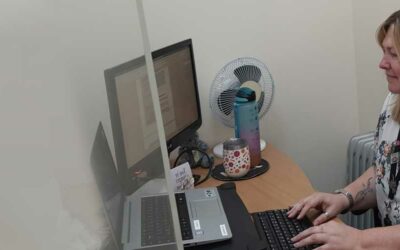This year’s Mental Health Awareness Week took place from 15-21 May and focused on anxiety. The Mental Health Foundation sparked a nationwide conversation surrounding anxiety. And encouraged people to share their experiences of and ways of managing anxiety. As as well as to seek support if they feel their anxiety is becoming a problem.
What is anxiety?
‘Mind’ describes anxiety as:
A natural human response when we feel that we are under threat. It can be experienced through our thoughts, feelings and physical sensations.
Anxiety can manifest in a variety of ways such as increased heart rate, shortness of breath, rushing thoughts and loss of appetite. If persistent, anxiety can have long-term effects. Cambridge University, for example, found that severe anxiety could be linked to a 52% increased incidence of cardiovascular disease (CVD). Champion Health estimates that over 8 million people in the UK are experiencing anxiety at any given time. The prevalence of anxiety in our society, and the impact it poses on health, highlights the importance of mental health awareness.
How do I know if my anxiety is becoming a mental health problem?
It may be difficult to know if and when you need help managing your anxiety. Below are some instances of anxiety which may resonate with you:
- your feelings of anxiety are intense and last a long time
- your fears and worries are perhaps out of proportion to the actual situation
- you avoid situations, such as shopping, or meeting with friends, due to anxiety
- you suffer symptoms of anxiety which are difficult to control, such as panic attacks
- you find it difficult to go about your everyday life and do the things you enjoy

What can I do to manage my anxiety?
Below are some techniques you may be able to carry out yourself, in order to reduce symptoms of anxiety:
- focusing on breathing (such as the 4-7-8 breathing technique): this can lower heart rate, making you feel calmer and more able to undertake everyday tasks
- get moving: exercise improves your mental and physical wellbeing, as well as providing opportunities to socialise
- connecting with people: spending time with like-minded people and support groups can make you feel less alone
- keeping a diary: ignoring stressful thoughts can only intensify them, writing and visualizing your thoughts may help you make sense of them.
- online Cognitive Behavioural Therapy (CBT) courses: these can be self-administered or delivered by professionals and are often free. CBT aims to challenge automatic negative thoughts and develop healthy and rational responses to situations.
- you can also contact your local GP for advice

Anxiety and The Cost of Living
Over 40% of people in the UK will suffer from anxiety in their life, yet 45% reportedly keep it a secret. Mental Health Awareness Week aims to reduce the stigma of anxiety by encouraging people to talk about their experiences.
Anxiety may cause you to avoid keeping on top of money. For instance, anxiety may be triggered by situations such as opening an envelope or attending benefits assessments.
The Mental Health Foundation reports that more than a third of adults worry about finance. With over 8 million adults in the UK experiencing anxiety, it may be more important than ever to seek help if you feel your anxiety is becoming a financial problem.
In our reporting period of April 2022 to March 2023, the number of people reported having anxiety, depression and Mental Health illness were:
- 328 Anxiety
- 324 Depression
- 387 Mental Health illness
During this period we provided advice and support to 2138 clients in respect of debt issues I.e. financially struggling, financial capability and being chased by creditors for outstanding payments.
We assisted with the following sub matter types:
• Council Tax charges and arrears
• dealing with debt repayments
• Debt Relief Orders
• fuel debts
• water supply and sewerage debts
Getting help
You can receive help with financial issues from us at Advice Portsmouth or if you are a Portsmouth City Council tenant. Please speak with your Housing Officer for further advice and support. We understand the difficulties of current living and aim to advise and support our clients to face their problems. If you would like advice and support with regards to finances, we would ask you to provide the following paperwork:
• last 2 months’ bank statements
• your income and outgoings
• proof of your income
• creditors’ paperworks
• copy of your bills I.e. Council Tax, TV Licence
Client feedback
Thank you so much, you probably saved my life, people like you are amazing. I can never thank you enough
I was in a very bad place in debt and mental health but I am so graetful to my advisor Vic she has helped me sort everything out with support and advice. No judgement was made. Thank you for everything, you time, your help
If you need assistance and live in Portsmouth, please contact us on 02392 794 340 or advice.portsmouth@theyoutrust.org.uk



